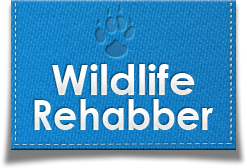Ways To Help
- Assist a rehabilitator or at a facility by volunteering.
- Volunteer to answer phones a few hours per month.
- Volunteer at fundraisers
- Don’t have the time to volunteer with wildlife? Consider becoming a transporter and delivering wildlife to local rehabilitators on your way home from work.
If you are interested in becoming a wildlife rehabilitator take our rehabilitator self-assessment quiz then find a wildlife facility or rehabber near you who can guide you through the training and permitting process.
Here are some common (and not so common) items that rehabilitators would appreciate receiving:
- Fruit tree prunings.
- Excess garden vegetables.
- Caging
- Dog runs or kennels
- Pet carriers
- Dog crates
- Reptile habitats
- Wire cages with trays
- Caging should be in fairly good condition with no rust.
- Lumber, fencing and other materials to build outdoor caging (2X4s, hardware cloth,etc.)
- Wild Bird Seed
- Minnows and other fish (live or frozen)
- Dry puppy food
- Duck mash (eggmaker crumbles) from Feed & Seed
- Crock style feeding bowls
- Heating Pads
- Kiddie Wading Pools
- Any and all medical supplies!
- Syringes
- Antibiotics
- Wormers
- Antibiotic ointment
- Duoderm or Tegaderm
- Thermoplastic scraps (used for making splints)
- Vetwrap
- Any expired medical supplies
- Injectible fluids
- Scratch grains from Feed & Seed
- Esbilac puppy formula from pet stores or mail order
As with an situation in which you may be in contact with a wild bird or mammal, please take every precaution to protect yourself first.
“Road kill”? Did you know that baby opossums can survive for several hours in their dead mother’s pouch? Many of these babies can survive if taken to a wildlife rehabilitator. Handy items to keep in your car:
- A shoe box lined with a soft towel (perfect for really small mammal and baby birds)
- A pillow case with tie or rubberband (takes up very little space but can easily and safely accomodate most small to medium sized birds and some mammals)
- A small pet carrier
- An old large bath towel (can be used for capture as well as restraint)
- Heavy duty gloves.
- Make your yard wildlife-friendly by providing shelter (foilage, bushes, birdhouses, squirrel nestboxes, etc) and a source of fresh water.
- Plan to allow a 4 square foot area in your yard overgrow so that young mammals and hopping baby birds have a place to hide.
- Please keep your cats indoors.
- When the weather is below freezing, remember to frequently replace the giant frozen “ice cube” in your outdoor bird bath with clean water.
- If you absolutely have to trim or take down any trees, do it while the leaves are off the trees and definitely before baby season starts.
- Winter is one of the “lean” months for our native birds. Keep your bird and suet feeders full.
- Repair any damaged areas in your home (roof, eaves, missing foundation vents, etc) before nesting activity begins.
- Cap your chimney. It can be a death trap for most wildlife. The exception? If you have an older chimney that chimney swifts use. They are nature’s perfect misquito control.
- Consider planting for wildlife. Grow some birdhouse gourds and sunflowers.
- Starlings and robins routinely use exhaust, dryer, stove and bathroom vents as nesting sites. This is potentially dangerous for both the bird and the homeowner. Replace your flap vent with new bird-proof vents (they run about $5).
- Unless you live on a farm, PLEASE do not buy those cute baby chicks and ducklings that are available for Easter. They do not make good presents for children, and quickly die from over-handling. Yes, we know you were told you could bring them back once they got bigger. Would you like to know what they do with them after you bring them back?…. If you’re planning on releasing the ducks yourself, please be aware that our local waterbodies can not handle the addition of any more domestic ducks.
- Vaccinate your pets.
- Plant some native plants on your property. It’s an excellent source of food and shelter for our wildlife.
- Be kind to the environment. Please be careful about the use of fertilizers, insecticides and weed killers on your lawn.
- If you’re planting bulbs, remember to place wire 1 inch below the dirt level to protect them from wildlife.





